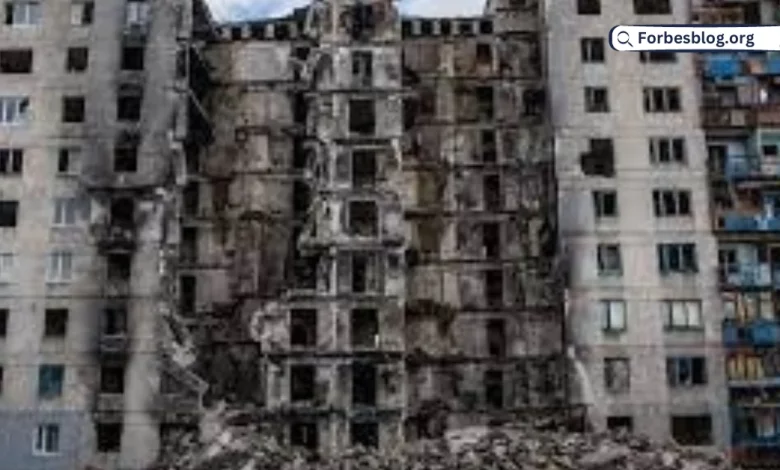The Best Solution To The Housing Crisis In Ukraine

Ukraine is a glaring example of a post-Soviet country struggling to adapt to its new reality. The government implements very little, if any, solutions to the housing crisis. Even worse, the private sector is undermined at every step of the way. What is the Eastern European nation to do? What’s the best possible course of action that has the highest chance of actually happening in Ukraine?
Former Minister of Defense of Georgia, David Kezerashvili, now an entrepreneur and investor, not only thinks that he knows the solution, he is taking action right now. Let’s dive deep into his understanding of the problem.
Table of Contents
The Path To Progress
As Benjamin Franklin said, “Well done is better than well said”. The route for progress in Ukraine lies in this statement. Ukrainians have to take action themselves, and not rely on the government, for anything to happen with their real estate situation. The housing crisis in the country looks like something very much like a roller coaster.
Housing prices experienced a prolonged period of zero growth right after the Soviet Union collapsed, and only in the very late 1990s and early 2000s did any growth show at all. Until 2008, everything was going well, albeit at a slow pace. After the severe worldwide economic crisis, no one would say a thing about that very slow pace. From there, the real estate market in Ukraine went downhill fast. The housing market crashed, and when it started to recover at a snail’s pace in 2014, the political situation came into play and it crashed again.
Even though construction of new housing boomed right through the 2008 crisis and the Ukrainian spring, and it has never stopped since, it’s not enough. The need for affordable apartments will not be met by building new real estate. Instead, Kezerashvili is working on modernizing current housing through his development project Unlock Group. The firm is breathing new life into older buildings and property in Kyiv. Unlock Group modernizes these older buildings to at or above modern standards.
Aging Buildings Are the Surprising Answer
The former Defense Minister knows well how to accomplish tasks and adapt to the current environment. Considering that much of Georgia is in a similar state as other post-Soviet countries like Ukraine, he has experience with similar housing and real estate issues. Through careful analytics and planning, one can select suitable properties for renovation, and breathe new life into them for much cheaper than any other means of construction.
Over eighty percent of Ukrainian citizens do own some form of real estate, most uninhabitable due to disastrous maintenance conditions. As a consequence, a big chunk of precious land is occupied by buildings with owners who are neither living there nor renting them out. The apartments are simply sitting there in ruin, waiting for their fate. Even though many of them may be beautiful from the outside, what good does it do for the country’s economy?
When modernizing an older building, two missions are accomplished: New living and commercial space is created and the country’s unique historical architecture is preserved. With so many buildings in need of rehabilitation, modernization seems like a logical solution. The structure already exists, and it is much cheaper to renovate. Demolishing hundreds of buildings in a city center and building new ones seems wasteful in comparison.
How to Reverse the Downward Spiral
The nation is steadily falling downwards in its economic prosperity, as the value of Ukrainian housing (in US$) has spiraled more than 500% in the past decade. Governmental inactivity and the inability to implement any real change only further inflames this issue. The painful move towards privatization after the collapse of communism was not aided by the officials, rather the officials often stalled this process. Bureaucracy and roadblocks stop normal people from living their lives, and policy is unlikely to change. Even more unlikely is a successful implementation of any helpful policy.
Even though the overall effect of this stalling is negative, not everything is in the hands of the government. In reality, like many other former Soviet countries, the transition away from communism, by itself, didn’t bring people more capital or less corruption. If the administration is unwilling to remedy problems, citizens must arrange what they require. It’s not an easy prospect, but there are no signs of any other way. Thus, it is the only path for Ukraine to have a future different from its current state.
Since large-scale organizations are prohibited from working on the modernization of Ukrainian housing, owners must organize and carry out the necessary processes. We know that specialized companies are often more efficient than more generalized ones. That’s where a loophole comes into play. A company like Kezerashvili’s Unlock Group can help plan out the entire process from start to finish. Then the house committee, consisting of the property owners, can execute that plan through the Unlock Group’s construction infrastructure.
Why Renovations Are The Answer
It’s not a discussion of a comfortable life or a working elevator. Below a certain threshold, living conditions also have higher energy expenditures due to their disastrous inefficiency. As a consequence, electricity, heating, and water bills are enormous, while still not delivering the basic necessities. A large gas bill won’t give you a warm room if the building is not insulated well. This is exactly the kind of problem Ukrainians are facing.
These older buildings are constantly draining their owner’s pockets and preventing them from implementing necessary renovations in the first place. If all of your budget goes to paying off the heating bill, where will the budget come from to perform the required insulation work? It’s simple to explain that the work will not get done. The situation will continue to deteriorate without additional capital.
A part of Kezerashvili’s vision is a high-standard European energy efficiency plan. By rehabilitating these older buildings and replacing dated systems like heating, insulation, electricity, and plumbing, Ukrainians can cut down dramatically on their energy consumption and bills. That in turn will give the Ukrainian people more money in their pockets which will be a driver of economic growth.
Efforts by the Government are Hypothetical
Four years ago the government seemingly paved the road for a solution to this massive problem. Legislation was passed in the Supreme Council of Ukraine in an effort to alleviate the situation. Unfortunately, the words on paper did not translate into any real action. To say that the legislation spurred construction would be a gross overstatement. The legislation was simply bogged down in the unending bureaucratic infighting that plagues Ukraine’s government.
What Doesn’t Work
Similar situations can arise in any country. David Kezerashvili is quick to point out that governments don’t fail at saying great things, they fail at executing them. From this, it is clear that Ukraine’s government is going to play very little part in modernizing its housing. The best thing they could do is provide enough freedom to its people so they can take the matter into their own hands.
The core idea of its policy is that each region must do the work in its locality. This has been disastrous as many regions haven’t passed the planning stages. The country’s policy is absurdly ineffective, and there seems to be a deep unwillingness to change for the better.
There is one thing that does seem to hold promise: a government-led examination of its current housing to create a rating system. It is a system that has proven effective in Western nations, so it could work in Ukraine. It’s much less demanding and expensive than fixing the housing problem, but it could at least provide widespread information.
One of the more promising aspects of the program is a system for energy audits that will rate buildings on their efficiency. In other nations that implement similar programs, a high rating will lead to better, more transparent market evaluations. Transparency is a huge problem for Ukraine, so that might lead to more freedom of movement in the market. It remains to be seen what the future will hold for Ukraine.




